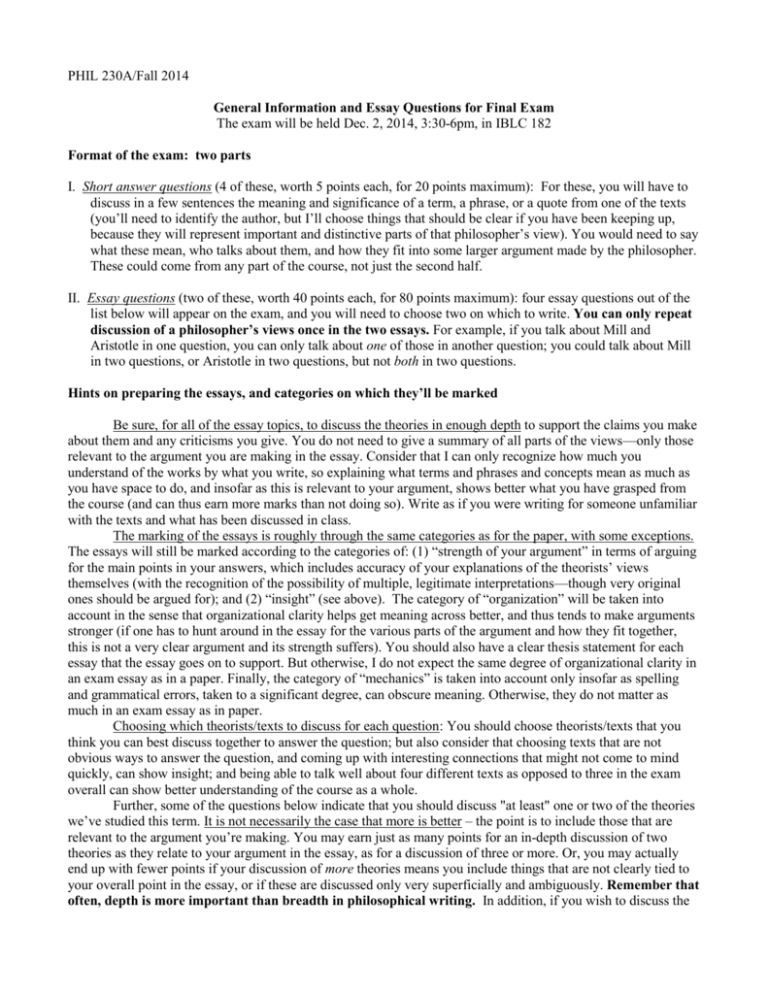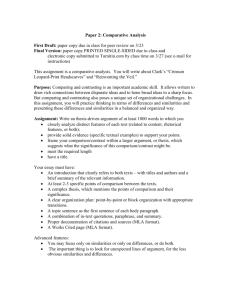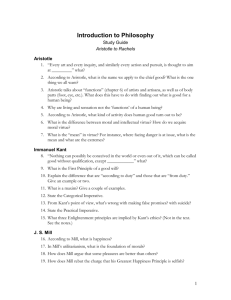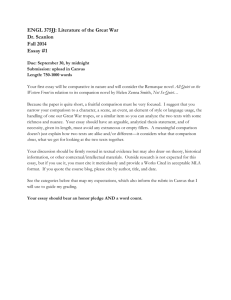PHIL 330A * Social & Political Philosophy
advertisement

PHIL 230A/Fall 2014 General Information and Essay Questions for Final Exam The exam will be held Dec. 2, 2014, 3:30-6pm, in IBLC 182 Format of the exam: two parts I. Short answer questions (4 of these, worth 5 points each, for 20 points maximum): For these, you will have to discuss in a few sentences the meaning and significance of a term, a phrase, or a quote from one of the texts (you’ll need to identify the author, but I’ll choose things that should be clear if you have been keeping up, because they will represent important and distinctive parts of that philosopher’s view). You would need to say what these mean, who talks about them, and how they fit into some larger argument made by the philosopher. These could come from any part of the course, not just the second half. II. Essay questions (two of these, worth 40 points each, for 80 points maximum): four essay questions out of the list below will appear on the exam, and you will need to choose two on which to write. You can only repeat discussion of a philosopher’s views once in the two essays. For example, if you talk about Mill and Aristotle in one question, you can only talk about one of those in another question; you could talk about Mill in two questions, or Aristotle in two questions, but not both in two questions. Hints on preparing the essays, and categories on which they’ll be marked Be sure, for all of the essay topics, to discuss the theories in enough depth to support the claims you make about them and any criticisms you give. You do not need to give a summary of all parts of the views—only those relevant to the argument you are making in the essay. Consider that I can only recognize how much you understand of the works by what you write, so explaining what terms and phrases and concepts mean as much as you have space to do, and insofar as this is relevant to your argument, shows better what you have grasped from the course (and can thus earn more marks than not doing so). Write as if you were writing for someone unfamiliar with the texts and what has been discussed in class. The marking of the essays is roughly through the same categories as for the paper, with some exceptions. The essays will still be marked according to the categories of: (1) “strength of your argument” in terms of arguing for the main points in your answers, which includes accuracy of your explanations of the theorists’ views themselves (with the recognition of the possibility of multiple, legitimate interpretations—though very original ones should be argued for); and (2) “insight” (see above). The category of “organization” will be taken into account in the sense that organizational clarity helps get meaning across better, and thus tends to make arguments stronger (if one has to hunt around in the essay for the various parts of the argument and how they fit together, this is not a very clear argument and its strength suffers). You should also have a clear thesis statement for each essay that the essay goes on to support. But otherwise, I do not expect the same degree of organizational clarity in an exam essay as in a paper. Finally, the category of “mechanics” is taken into account only insofar as spelling and grammatical errors, taken to a significant degree, can obscure meaning. Otherwise, they do not matter as much in an exam essay as in paper. Choosing which theorists/texts to discuss for each question: You should choose theorists/texts that you think you can best discuss together to answer the question; but also consider that choosing texts that are not obvious ways to answer the question, and coming up with interesting connections that might not come to mind quickly, can show insight; and being able to talk well about four different texts as opposed to three in the exam overall can show better understanding of the course as a whole. Further, some of the questions below indicate that you should discuss "at least" one or two of the theories we’ve studied this term. It is not necessarily the case that more is better – the point is to include those that are relevant to the argument you’re making. You may earn just as many points for an in-depth discussion of two theories as they relate to your argument in the essay, as for a discussion of three or more. Or, you may actually end up with fewer points if your discussion of more theories means you include things that are not clearly tied to your overall point in the essay, or if these are discussed only very superficially and ambiguously. Remember that often, depth is more important than breadth in philosophical writing. In addition, if you wish to discuss the view of a theorist assigned in the course but not on the list for each question you may do so, so long as you also discuss at least what is required by the question itself. Four of the following will be on the exam; you’ll choose two on which to write 1. Virtue ethics claims for itself a significantly different approach to ethics than that of consequentialist or deontological theories, by focusing on character traits rather than (only) on rules or principles. Evaluate the benefits and drawbacks of virtue ethics and either consequentialism or Kantianism, being sure to discuss the view of Aristotle as well as at least one out of: Mill, Brandt, Kant (you can also talk about Hursthouse and/or Nussbaum, if you wish). 2. Evaluate the following statement: “Virtue ethics, as we’ve studied it in this course, is the same as Mill’s utilitarianism except that it focuses on moral qualities of persons where Mill focuses on moral qualities of acts.” Discuss the degree to which this makes sense with reference to the view of Aristotle, or Aristotle plus the views of either Hursthouse or Nussbaum. 3. Would you say that there are some drawbacks to utilitarianism, whether in Mill’s view and/or Brandt’s view, that Kant has a better approach to, and vice versa? In other words, are they both getting to something important in morality but missing something that the other supplies? If so, explain what and why. If not, discuss whether one approach is stronger than the other, in your view, or whether they are both problematic in ways that don’t complement each other. 4. Kant claims that the various forms of the categorical imperative he gives are equivalent, but Korsgaard argues that the first and second forms can give different answers in the case of lying to the murderer at the door. Discuss how the first and second forms of the CI be could be said to be related (even if you don’t agree with or fully understand Kant’s arguments on this, come up with your own explanation), and evaluate Korsgaard’s claim that they give different answers to the murderer at the door situation. 5. “[M]ost people…take refuge in theory and think they are being philosophers and will become good in this way, behaving somewhat like patients who listen attentively to their doctors, but do none of the things they are ordered to do. As the latter will not be made well in body by such a course of treatment, the former will not be made well in soul by such a course of philosophy” (Aristotle II.4, p. 10). Why, for Aristotle, is knowing moral theory not enough to make people good and what, in your view, could he or another virtue ethicist we’ve studied say about the point of studying moral theory if it’s not enough to make people good? Then compare/contrast to what either Mill or Kant might say about what studying moral theory could do for making people act morally well. Optional: you may also discuss your own views on this question, in relation to those of the philosophers you discuss. (Notes on #5: This question requires a good deal of thought on your part beyond what the texts say explicitly, but do base your arguments about what virtue ethicists and Mill or Kant would say on what they do actually argue in their texts, as much as you can. Also, for this question, go beyond the basic idea that we may need to construct ethical theories to know what’s right and wrong and why, which is pretty obvious!)










